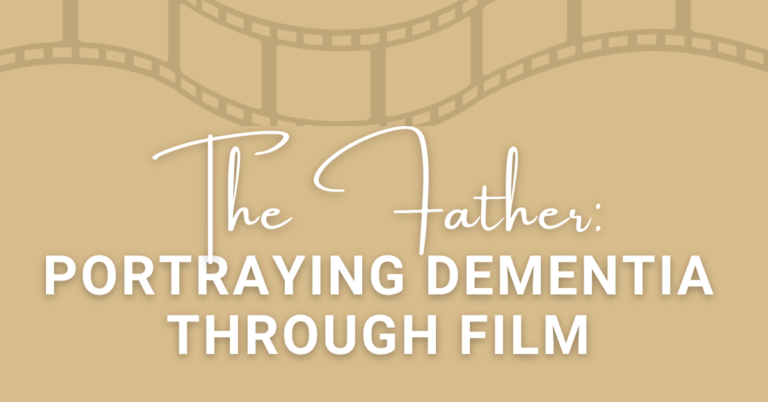* SPOILERS AHEAD *
A movie about a woman struggling to care for her father with his ever-worsening dementia was always going to be sad. What I didn’t expect was for the film to show us dementia through the eyes of the victim. The Father takes the audience on an incredibly emotional journey, giving a difficult insight into the decline of the human mind.
Dementia is a general term describing a decrease in some mental abilities. This often includes confusion, anxiety, mood swings, paranoia and memory loss. These are all symptoms that we see our main character, 80-year old Anthony, suffering from. We experience the film through Anthony’s fractured memories which, at times, is admittedly confusing. Everything is tied together at the end with the revelation of where Anthony has actually been the entire time.
Plot Summary
The opening scene shows Anthony (Anthony Hopkins) being visited by his daughter, Anne (Olivia Coleman), in his London flat. They have an argument over how Anthony keeps scaring away his carers. It’s established in this scene that he’s suffering from dementia and is in deep denial of it. We also learn Anne will be moving to Paris with her new partner, Paul, which is why she’s desperate to find a full-time carer.
As the movie goes on, it continues to explore Anthony’s confusion with names, faces, locations and events. He can’t differentiate between where he used to live and where he is living now. He sometimes mixes up Anne’s old partner with her new one. In one scene, Anne walks in with a different face as he forgets what she looks like.
Throughout the movie, we watch as Anne struggles with caring for her father conflicting with her own personal freedom. She finds it difficult to care for a dementia patient who is insistent on being self-reliant. The events we see in the movie actually span over the course of several years. Eventually, we understand Anne restored to finding a care home for her father. Every day the nurse has to remind Anthony of this as he struggles to retain new information. Unable to accept Anne’s departure and understand his own mind, he breaks down in a really emotional final scene.
The Fear Of Loss and the Perception of Time
In the film we get conflicting scenes as Anthony, and the viewers, try to work out what is and isn’t real. Any scenes with Anthony present are unreliable. Time is constantly shifting back and forth, and the story we are given isn’t always chronological. He is desperate to hold on to a clear perception of time. A recurring theme is Anthony’s obsession with his watch. He is always losing it and blaming others for stealing it. This is really clever symbolism showing how Anthony is no longer able to understand the passing of time.
Anthony relives moments of his past over and over again. In his mind, these memories are the present. Sometimes we see scenes more than once but with alterations to the dialogue and background. Dementia sufferers struggle to maintain short-term memories. Time isn’t the only thing that Anthony fears losing. He’s afraid of losing his home, his daughter, and his independence. As his fractured mind tries to make sense of where he is, the scenery of the flat around him subtly changes all the time. As Anthony doesn’t always know where he is, neither does the viewer.
Final Thoughts
What I loved about the film is that it didn’t actually comment on whether or not Anne made the right choice. There are many personal and circumstantial factors involved with making a difficult decision like the one Anne made. The film never wanted to make a judgement call on that. We saw Anne trying to make it work and sacrificing many things, including her marriage, to care for her father. She only ever wanted the best for him which is reflected clearly in the choices she makes.
Personally, I have never witnessed dementia being portrayed like this. The film is crafted in such a clever way that helps you understand Anthony’s recollection of his life. The audience sees the world through the eyes of a dementia patient. This helps us understand the confusion and frustration he’s feeling. I think this movie is essential viewing for everyone. It explores the hardships dementia has on the patient and everyone around them in a raw and unforgiving way.
Did you see ‘The Father’? Let me know your thoughts in the comments below!


I really want to see the film but because I’m going through something similar at the moment, I know it will be difficult to watch. Great review.
It was a really clever film. Dementia is a horrible thing for any family to have to go through. It was a difficult watch for sure, but it was very well made and tackled the topic in a sensitive manner whilst also not holding back from the realities of it.
Wow, this film sounds brilliant and I love your honest review on it xx
Thanks for reading. I’d definitely give it a watch the next time you’re feeling something slightly more heavy and thought-provoking.
Great review! I’d never heard of this before but it sounds really hard hitting and like it covers such important topic matter. Thanks for sharing x
Would definitely recommend giving it a watch!
I’ve never seen this movie before but it seems interesting to watch as it can happen in real.
Fransic – https://www.querianson.com
Yeah, it was a really interesting film for sure!
Lovely review, Kate! It’s always nice to watch movies that show things from a different perspective and makes you think. I’ve never heard of this movie before but I definitely want to check it out. Thanks for sharing!